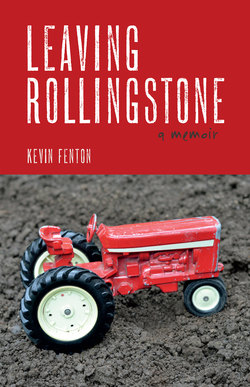Читать книгу Leaving Rollingstone - Kevin Fenton - Страница 10
PORTRAIT OF THE ARTIST AS A HISSING TODDLER
ОглавлениеSomething else was happening in those first years. One of my first memories—and perhaps my first thought—was brand awareness. Short as a fire hydrant, waddling through Rollingstone, I marveled at litter and logos—the barbed crowns of Grape Nehi and Squirt bottle caps, the pale imprints of Mallo Cup cards, the discarded cylinders and spears of Orange Push-Ups.
Once while we were living in the house in town, I was eager to get somewhere—probably the creamery next door. I tripped over a ridge in the sidewalk, pitched forward, and shattered my teeth. This happened just as speech would otherwise have become second nature to me. To this day, I don’t speak well, and when I hear myself on tape, I cringe at the way words slosh in my mouth, and I can hear, in my hesitations, thoughts sparking and failing in my brain. I also now suspect that when my teeth shattered, language scurried back into my brain and a fissure opened between me and the world. I became slightly untethered.
But my shattered teeth and windy speech had an upside: I started to seek out printed matter. We weren’t a literary family, so what I sought out wasn’t even a toddler’s idea of literature. To the best of my knowledge, I was read no stories. Mom was too busy; Dad had other problems. Dad bragged about reading only one book in high school—Huckleberry Finn—and giving four book reports on it. The only book I remember in the house in those days was the Bible. Because we were Catholics, we didn’t read the Bible, trusting the priest to interpret it for us. Ours was as heavy as an anvil.
Outside of litter, the first legible things that beckoned to me were the packages that lined supermarket shelves. As my mom piloted me through National Foods or A&P in Winona, I felt as if I’d encountered a menagerie filled with red and green roosters, friendly tigers, perky rabbits, bears in porkpie hats, impish creatures who devoted their lives to cereal or cookies, reassuring Quakers, serene chefs. As soon as I could recognize words, I realized that print is always fluent.
Sometime in the sixties. The living room was still nesty with Christmas—with bits of wrapping paper, with the artificial tree decorated with blue lights, with the toys that hadn’t yet migrated to my room. The house smelled of hot metal, warmed plastic, and pocketbook cookies. I was intent as a surgeon on my favorite Christmas acquisition, Fright Factory. I had poured two colors of Plastigoop into a mold, warmed it in a “heating unit,” and immersed it, hissing, in water. Now, as I pulled loose the face I had created, the skin stretched. The face’s skin was discolored, its musculature exposed, its surface stitched. My interest in Fright Factory was more fascination than enthusiasm; something dark swam in that pretend flesh.
